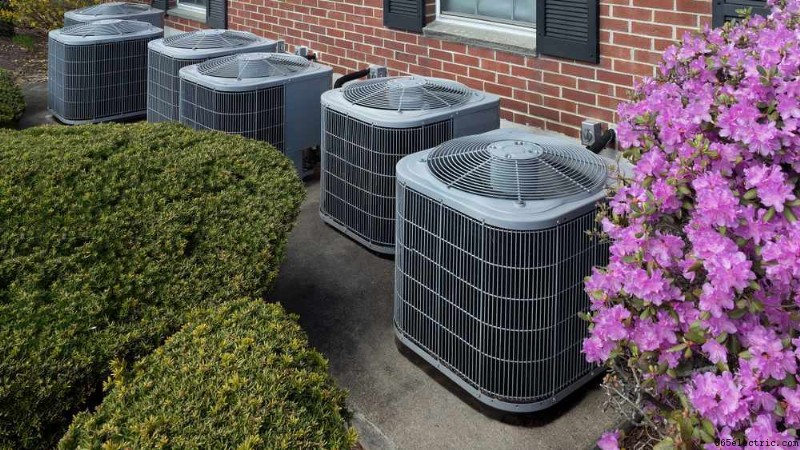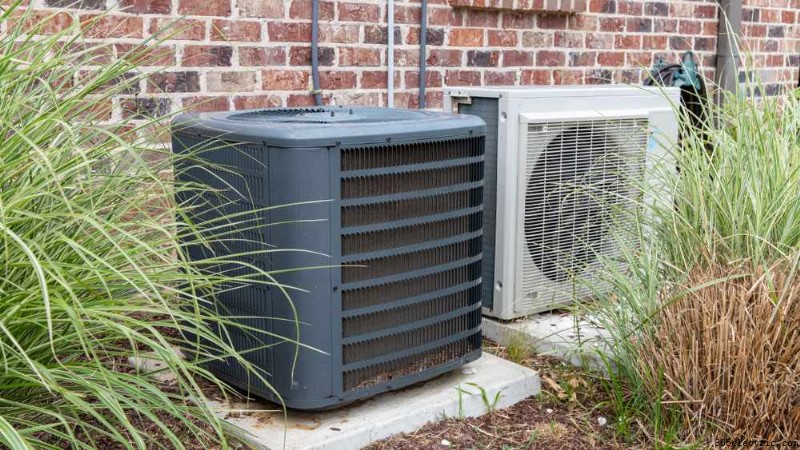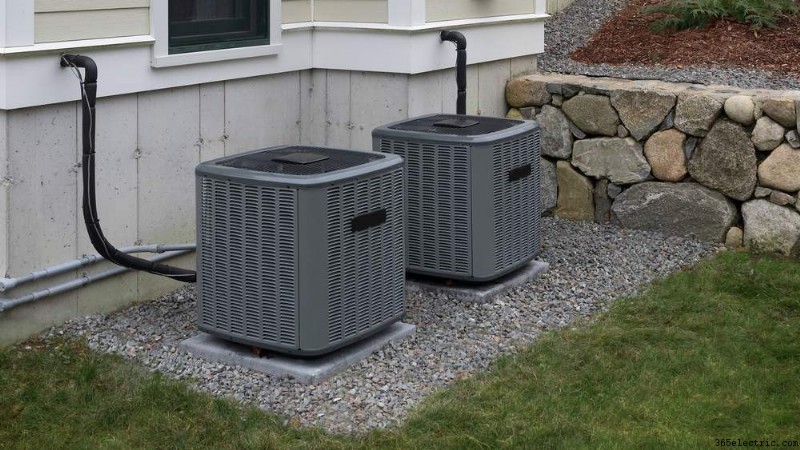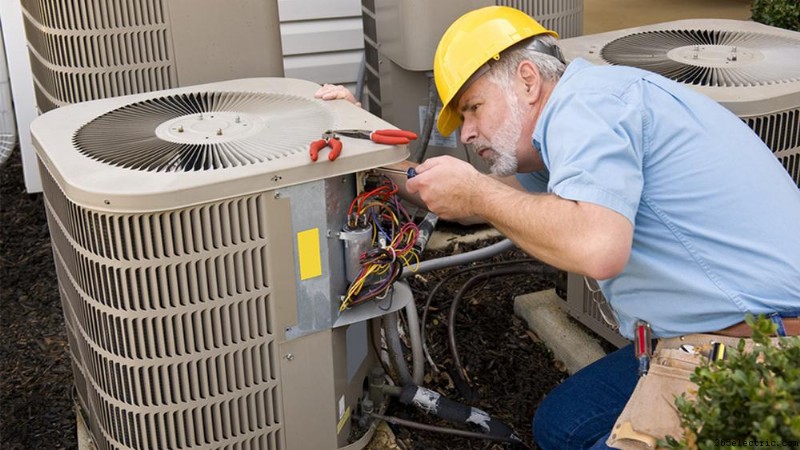AC コンプレッサーの故障の 10 の原因とコンプレッサーの故障を回避する 7 つの方法

夏のシーズンに最も避けたいことは、暑い灼熱の日にエアコンが作動していないことを発見することです。 AC の問題の中にはそれほど費用がかからないものもありますが、その理由が AC コンプレッサーの故障であることが判明した場合は、間違いなく財布に大きな打撃を与えます。
幸いなことに、タイムリーに検出されれば、問題の大部分は予防可能です。
問題を早期に診断し、将来の問題を防ぐために実行できる手順を提供するのに役立つ広範なリストをまとめました.
AC コンプレッサーの機能
コンプレッサーは重要なコンポーネントであり、HVAC システムの心臓部と考えられています。冷却物質である冷媒を圧縮して、AC 内を流れて熱 (可逆 AC の場合は冷気) を除去します。
適切なお手入れをすれば、10 年から 15 年とかなり長持ちします。
ただし、AC の維持に失敗すると、磨耗が増加します。ほこり、破片、または冷媒の漏れは、AC コンプレッサーの機能に大きな影響を与えます。
したがって、コンプレッサーが故障した場合は、HVAC の緊急事態が発生したことを意味します。いくつかの不幸なシナリオでは、それを修正することができず、交換が唯一のオプションです.
エアコンのコンプレッサーはどのように機能しますか?
熱は温度の高いところから低いところに流れます。エアコンも同じ原理で動作します。
エアコンのコンプレッサーは、冷却プロセスで主要な役割を果たします。冷媒は蒸発器から熱を回収します。その後、圧縮機に流れ、そこで冷媒の体積を減らして液体の状態にします。冷媒は圧縮すると温度が上がり、高圧の気体になります。その後、凝縮器コイルに流れ、外部に放出される熱を放出します。その後、再び液体に変換され、室内ユニットに流れます。このプロセスを何度も繰り返して、冷媒サイクルを完成させます。
エアコンの仕組みについて詳しくは、次の記事をお読みください:エアコンはどのように機能しますか?
AC コンプレッサーの故障の 5 つの兆候

コンプレッサーの修理や交換には費用がかかります。エアコンのコンプレッサーの故障につながる可能性のある問題をできるだけ早く検出したいと考えています。そこで、コンプレッサーが故障しそうになっていることを示す 5 つの早期警告サインを以下に示します。
1.気流が弱い
エアフローの減少は、AC コンプレッサーの故障の初期症状の 1 つです。ただし、家が十分に涼しくないと感じた場合、最初の数日間は温度を下げ続けるため、それに気付くのは非常に難しい場合があります.
気流が弱いかどうかを確認する最善の方法は、通気口の下に手を入れることです。空気の流れがほとんどまたはまったく感じられない、または涼しいはずのときに暖かい空気を感じる場合、これはエアコンにコンプレッサーの問題があることを意味します.すぐに HVAC の専門家に連絡して、修理してもらう必要があります。
この記事を読んで、HVAC の気流の問題について詳しく学んでください。
2.大きなバンギング ノイズ
HVAC ユニットが大きな音やうなり声で始まり、それに伴う振動に気付いた場合は、すぐに警告する必要があります。さまざまな問題の兆候である可能性があり、AC コンプレッサーの故障はその 1 つです。
これらの AC ノイズは、コンプレッサーの始動に問題があり、将来故障する可能性があることを示しています。また、コンプレッサ内の電気部品の故障を意味します。
すぐにユニットの電源を切り、専門家にシステムの徹底的な検査を依頼してください。
3.冷媒の漏れ
冷媒漏れの明らかな兆候には、弱い空気の流れ、シューという音、HVAC ユニットの周りの水、または蒸発器コイルの氷の形成が含まれます。冷媒漏れは、さまざまなトラブルにつながる可能性があるため、早急に対処することをお勧めします。システムの冷却に影響を与え、長期的にはコンプレッサーの故障を引き起こす可能性があります。毎月のメンテナンスは、コンプレッサーが損傷する前に冷媒の漏れを早期に検出するのに役立ちます。
4.電気代が高い
家を冷やすために AC コンプレッサーをもっと働かなければならない場合、より多くの電力を消費し、より頻繁に作動するため、電気代が大幅に増加します。
そのため、使用量が増加していないのに請求書が突然急増したことに気付いた場合は、懸念事項です.すぐに HVAC ユニットをチェックして、動作していないかどうか、修正が必要かどうかを確認する必要があります。
AC コストを削減する 16 の超簡単な方法を紹介します。
5.サーキットブレーカーが落ちた
When a circuit breaker trips, it is a measure to protect your appliances from an electrical overload. It happens when you have too many devices running simultaneously or due to a power surge.
However, if your outdoor unit is constantly tripping the circuit breaker, it is not a good sign and indicates AC compressor failure. It means that the compressor needs more power to run because it is overheating.
Turning it back on won’t help in this case; you must contact an HVAC professional immediately.
What Causes AC Compressor Failure? – 10 Common Reasons

AC compressor failure is usually due to an internal problem that impacts the performance of your compressor over time.
Here is the list of 10 common causes of air conditioner’s compressor failure that require your immediate attention:
1. Electrical Failure
An electrical failure can be caused by damaged contactors, wires, and fuses. Acids build up in your system as a result of electrical problems causing other parts of your AC to malfunction as well. Power surges can also result in electrical issues in your air conditioner.
Acid and oxidation buildup is usually a prominent sign of electrical problems in your HVAC system. A trained professional can detect acid buildup during a routine inspection, making the repairs before it gets out of hand.
2. Blockage of Condenser Coils
Lack of maintenance plays a big role in blocking your condenser coils. When they are clogged with grime and dust, they cannot release heat which puts pressure on the compressor. If you continue to run your system in this condition, your compressor can overheat and stop functioning completely.
3. Compressor Overheating
Overheating is a common cause of compressor failure, and there are many factors at play.
If direct sunlight falls on your outdoor unit and there is inadequate ventilation around it, it makes your unit’s compressor overheated. High voltages can also damage the motor causing the compressor to overheat.
Moreover, dirty coils, low refrigerant levels, and lack of insulation; all can contribute to compressor overheating, ultimately resulting in compressor failure.
4. Evaporator Motor Displacement
If your AC’s evaporator motor is displaced, it can force the refrigerant to return to the compressor. This pushes the compressor oil out of its place, and your system can face lubrication issues. It causes the compressor to lose its efficiency over time, and eventually, it will cease to operate.
5. Low Refrigerant Levels
You won’t cool your home without an adequate amount of refrigerant in your air conditioner. It is a common misconception that refrigerant levels decrease with time. Your air conditioner doesn’t use up the refrigerant. If the levels are low, there is likely a leakage that needs to be sorted urgently.
Low refrigerant levels decrease the pressure, which causes the compressor to work harder to push the refrigerant in the system. Eventually, the entire compressor will collapse.
Lack of maintenance can increase corrosion and cause cracks in the AC coils. Therefore, regular maintenance is the only way to avoid this issue in the future.
6. Too Much Refrigerant in Your Unit

Wondering how the excess amount of refrigerant got in your unit? Have you ever had an issue of low refrigerant level and called a technician to fix it?
A less qualified person may not know how to fill it up properly and end up filling it more than what is needed. The refrigerant levels must match exactly with the quantity specified by the manufacturer. High levels of refrigerant can lead to increased pressure in the system, causing premature AC compressor failure.
It’s always recommended to call an experienced HVAC expert to deal with air conditioner issues.
7. Lack of Lubrication
Your HVAC needs the correct amount of lubrication to function optimally. Without adequate lubrication, the wear and tear will increase, making your compressor work harder. When there are low levels of oil, your compressor parts rub against each other. This makes small parts come apart and are let loose in the system.
Loss of lubrication is mostly due to leakage from the evaporator, condenser, pipe connections, or the compressor shaft seal. An overstressed compressor is likely to break down earlier than its expected lifespan.
Getting your air conditioner serviced is the key to prevent this problem. The experts will check the lubricant levels, make any necessary adjustments and see if the oil pump is working fine.
8. Clogged or Damaged Suction Lines
Over time, the suction lines of your refrigerator can develop cracks and holes, hindering the refrigerant flow in the system. This puts stress on your compressor as now it has to use extra power to pump enough refrigerant through the unit resulting in a breakdown. One of the evident signs is a decrease in the cooling capacity.
If you notice your unit is not cooling like it’s supposed to, call an HVAC expert to have a look at the suction lines.
9. Dirt &Debris Stuck in the Outdoor Unit
Outdoor pollutants, dust, debris, soot, and moisture can enter your outdoor unit and cause issues for your compressor.
Moreover, air can also be introduced, and it can dispel refrigerant in the condenser. This can increase the temperature inside the compressor and can cause oil carbonization on the discharge valve. Oil carbonization results in residue buildup and makes the valves leak. Leaking valves further increase the temperature, causing more damage to the compressor.
You can avoid this problem by scheduling annual AC tune-ups.
10. Incorrect Sizing of Suction Lines
If your suction line is too long or too short, it can cause AC compressor failure. Wrong sizing can build pressure and overheat the compressor.
This issue mostly arises when an untrained or amateur technician attempts to repair the line and installs the wrong size. It is always best to call a professional for any AC repairs. They know what type of suction line is best suitable, and they will install the right length of the suction line.
7 Ways You Can Prevent AC Compressor Breakdown
If compressors fail before their expected life, the issue is mostly internal and can be avoided with proper care.
Here are seven steps you can follow to prevent AC compressor failure:
1. Inspect the Wiring
You need a regular professional inspection to check the wiring as you won’t be doing it on your own during monthly maintenance. Wiring issues can lead to acid accumulation which deteriorates many components of your air conditioner, including the most important one – your compressor.
During the inspection, the technician can check and replace any faulty wires and fuses before they lead to acid buildup.
2. Install Voltage Monitor or Surge Protector
You can install a voltage monitor or a surge protector to guard your unit against sudden high voltage, low voltage, or power surges. Some surge protectors even give you a compressor warranty in case of damage or compressor failure.
3. Remove Clutter Around the Outdoor Unit
Leaves, dust, grime, and other pollutants can get stuck inside the outdoor unit interfering with its functioning. Periodic cleaning of the outside unit is crucial to keep it running properly.
4. Keep the Suction Lines Clean
Temperature and pressure changes can impact the normal operation of your compressor. When suction lines become blocked due to excessive dirt, the pressure and the temperature increase, leading to overheating. An overheated compressor can fail quite rapidly.
5. Only Call Qualified Professionals
An unqualified technician can pose fatal problems for your air conditioner. As discussed above, they can fill the refrigerant too much, which can cause compressor failure. Similarly, while repairing suction lines, they may install a short or long suction line which can interfere with the compressor pressure.
Air conditioner repairs are a sensitive matter and should always be handled by HVAC experts.
6. Lubricate Your AC Thoroughly
Considering that the compressor is the heart of your air conditioner, keeping it lubricated is the key to its better health. Lubrication can help in avoiding compressor failure before the expected time.
7. Frequent Cleaning of AC Coils
AC coils collect a lot of debris and need frequent cleaning; failure to do so can interfere with the heat exchange process. When this happens, the compressor has to do extra work to remove the heat.
Now that you know all the causes of AC compressor failure, the lesson is never to ignore any warning signs. The delay will not make the problem go away; it will only add to the damage. If you cannot manage to take care of your system on your own, you can go for an HVAC preventative maintenance contract. This will help in getting the underlying issues fixed before they have a chance to damage the compressor.
